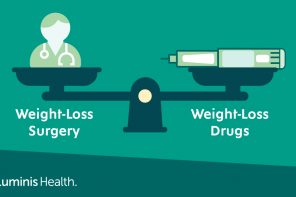You may have kicked off 2024 determined to lose weight. If you accomplished your goals, congratulations on your hard work and dedication. However, we know that maintaining weight loss can be just as challenging as achieving it. It’s tempting to reward yourself with old habits once you reach your goal, but remember, this is just one milestone in your journey to a healthier you. Let’s discuss a few steps you can take to maintain your healthy weight.
Healthy Weight Benefits
Achieving a healthy weight can lower your cholesterol and blood sugar levels, lower blood pressure, reduce stress on bones and joints and ease the workload on your heart. All these health benefits are why it’s important to not simply lose weight, but to maintain the weight you have lost. Contrary to what some may think, people without obesity generally have just as much difficulty sustaining a small degree of weight loss as people with obesity have maintaining even larger degrees of weight reduction.
It Takes Dedication
It’s no secret that many weight loss journeys fail in the long term. This can be because strict diets are difficult to maintain over time. Another factor is that the decrease in calories to lose weight causes a drop in the rate your body burns calories. For these reasons, extremely low-calorie diets and rapid weight loss are discouraged. Luminis Health weight loss experts recommend losing no more than half a pound to two pounds per week. Gradual weight loss such as this is more likely to help you sustain it for the long term.
Long-Term Weight Loss
Individuals who have successfully maintained their weight loss share some common strategies across the board. Regardless of which diet you use to lose weight to begin with, taking up these habits may help you to keep it off:
- Stay physically active—Try exercising for at least 60 minutes every day. Walking is a great low-impact option. Find an activity you enjoy and do it with someone who brings you joy!
- Keep a food log—Recording what you eat every day helps hold you accountable, sheds light on emotional eating habits and keeps you motivated.
- Maintain a balanced diet—What you eat each day should be healthy and well balanced, minimizing ultra-processed foods and high fructose corn syrup.
- Eat breakfast every day—This is important because eating breakfast boosts metabolism and staves off hunger later in the day, which helps prevent those late afternoon junk food binges.
- Regularly check the scale—Weighing yourself weekly may help you detect any small weight gains, enabling you to promptly take action if you see the number creeping upwards.
Keep Your Eye On The Prize
Although many people are concerned about weight loss because of how it affects their appearance, it’s important to remember that even a small amount of long-term weight loss can have remarkable health benefits. Remember to determine your weight management success based on your health and how you feel—not on how you look.

Dr. Jilian Nicholas, is a board-certified, fellowship-trained bariatric surgeon at Luminis Health.




